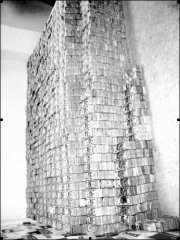Critical fetishes
dal 24/5/2010 al 28/8/2010
Segnalato da
El Espectro Rojo
A Kassen
Maria Thereza Alves
Francis Alys
Marti Anson
Karmelo Bermejo
Mariana Botey
Cuauhtemoc Medina
Miguel Calderon
Duncan Campbell
Jake Chapman
Dinos Chapman
Andrea Fraser
Fran Ilich
Fritzia Irizar
Jota Izquierdo
Roberto Jacoby
Fernanda Laguna
Alfredo Jaar
Magdalena Jitrick
Teresa Margolles
M & X
Raqs Media Collective
Vicente Razo
Gustavo Romano
Bea Schlingelhoff
Guillermo Santamarina
Santiago Sierra
Judi Werthein
Federico Zuckerfeld
The Red Specter
Cuauhtemoc Medina
Mariana Botey
Helena Chavez Mc Gregor
24/5/2010
Critical fetishes
CA2M Centro de Arte 2 de Mayo, Madrid
Residues of general economy features the works and projects of more than 20 artists (like Santiago Sierra, Jake & Dinos Chapman, Alfredo Jaar, Francis Alys) who, in their precise, diverse and tentative ways, engage in a poetic investigation of economies founded on heterogeneity - the heterogeneity of economic exchanges and of productive processes, underpinned by the logics of loss, expenditure and squandering.

Curated by The Red Specter (Cuauhtémoc Medina, Mariana Botey and Helena Chavez Mc Gregor)
Fetiches críticos: Residuos de la economía general [Critical
fetishes. Residues of general economy] is the first instalment in a
series of projects by El Espectro Rojo, a Mexico City-based collective
comprising Mariana Botey, Helena Chávez Mac Gregor and Cuauhtémoc
Medina which explores the intersection between artistic and
theoretical practices from a political, post-colonial and poetic
perspective.
Borrowing a figure from "The Eighteenth Brumaire of Louis Bonaparte"
by Karl Marx (1852) which invokes the ghostly aspect of the revolution
that still prevails in the grey era of hegemonic terror, El Espectro
Rojo examines the intersections where contemporary aesthetics and
politics transcend the framework of cultural complacency and the
liberal dogmas of today, and in doing so contribute to the formation
of a new radical culture.
For their first exhibition and the first issue of their newspaper,
produced by the CA2M, El Espectro Rojo uses various examples of
theoretical-aesthetic interventions to question the framework of
ordinary economic reflection, which has once again been accepted as
"common sense" in the dominant school of thought.
Recovering the ambivalence and complexity of the fetish category as
the focal point of critical theorisation in the consumer society, and
as a key concept of the relationship between enlightened thinking and
colonialism, Fetiches críticos: Residuos de la economía general
features the works and projects of more than 20 artists who, in their
precise, diverse and tentative ways, engage in a poetic investigation
of economies founded on heterogeneity – the heterogeneity of
economic exchanges and of productive processes, underpinned by the
logics of loss, expenditure and squandering. These works, which
appeal to an apparent economic "irrationality", all revolve around
interrogating the relationships between desire and production and
calling the accepted notions of "development", "underdevelopment" and
"efficiency" into question. In clear opposition to the melancholic
nature of contemporary reflection, Fetiches críticos sets out to show
how a variety of recent artistic interventions have invoked a constant
political and aesthetic transgression, in which the fetish notion
manipulates and distorts the fictions of usefulness, equivalent
exchange and investment rationality. All the interventions and works
assembled for the Fetiches críticos exhibition explore the complex
and multi-faceted capitalist system, in the north as well as the
south, as an economic system with fissures and paradoxes which art
exploits in a poetic quest for forms of practical and intellectual
dissent.
Largely inspired by George Bataille's intuition of a "general
economy" – a term first coined in "The Notion of Expenditure" (1933)
and further developed in The Accursed Share (1950) – and by
reflections on the fetish notion by authors such as William Pietz and
Marx himself, Fetiches críticos aims to transcend the miserabilist
description of the effects of the crisis of capitalism and demonstrate
how art documents moments of anti-production, defuses the myths of
development and launches the artwork as an object of desire and
subversion. In this respect, the show takes a stand against the
identification of dematerialisation and de-fetishisation as dominant
critical practice, calling instead for a reinstatement of the power of
contagion and dissemination of the fetish object of contemporary art.
The exhibition therefore offers a constellation of art objects that
displace and dethrone reason and calculation as the dominant forces in
economic thinking, in the hope of generating a brand-new political
experience.
THE ARTISTS
A Kassen, Maria Thereza Alves, Francis Alÿs, Martí Anson, Karmelo
Bermejo, Mariana Botey – Cuauhtémoc Medina, Miguel Calderón,
Duncan Campbell, Jake & Dinos Chapman, Andrea Fraser, Fran Ilich,
Fritzia Irizar, Jota Izquierdo (en colaboración con Abel Carranza),
Roberto Jacoby-Fernanda Laguna, Alfredo Jaar, Magdalena Jitrick,
Teresa Margolles, M & X, Raqs Media Collective, Vicente Razo, Gustavo
Romano, Bea Schlingelhoff, Guillermo Santamarina, Santiago Sierra,
Judi Werthein y Federico Zuckerfeld.
Until 29 Aug 2010
Collection II
Organised by CA2M Centro de Arte Dos de Mayo
In the spring of 2010 the CA2M will present a new selection of its works as part of a programme of temporary exhibitions to show the public the contents of the Contemporary Art Collection owned by the Regional Government of Madrid. There are currently over 1,500 pieces in the collection.
THE ARTIST
Sergio Belinchón, Bleda y Rosa, Daniel Chust Peters, Joan Fontcuberta, Elín Hansdóttir y Magret Bjarnadóttir, Axel Hütte, Riyas Komu, Miki Leal, Chema Madoz, Jill Miller, Antoni Muntadas, Perejaume, Peter Piller, Thomas Ruff, Wolfgang Tillmans, Javier Vallhonrat.
Press contact
Vicepresidencia, Consejeria de cultura y deporte Comunidad de Madrid
C/ Alcalá, 31 Madrid 28014
Tfnos.: 91 7208213 - 618337122 prensa.cultura@madrid.org
Opening: Tuesday 25 May 2010, 20:00 - 22:30
CA2M Centro de Arte 2 de Mayo
Avda. Constitucion, 23 - Madrid Spagna
Opening times From Tuesday until Sunday 11:00 a 21:00 h.



